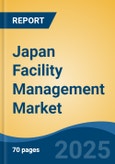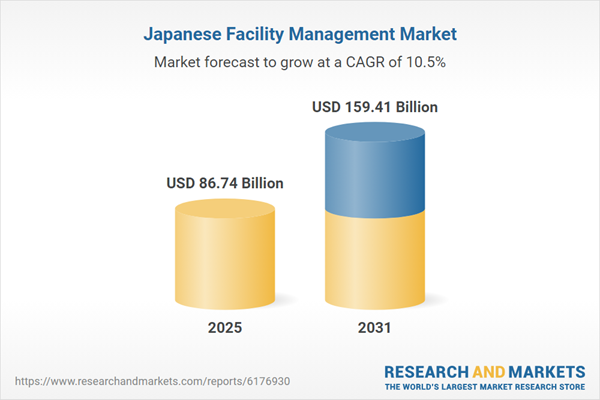Speak directly to the analyst to clarify any post sales queries you may have.
10% Free customizationThis report comes with 10% free customization, enabling you to add data that meets your specific business needs.
Japan’s Facility Management (FM) market is undergoing significant transformation and steady growth, driven by technological advancement, demographic shifts, and a strong emphasis on sustainability. As the country modernizes its building infrastructure, the demand for professional FM services continues to expand across commercial, industrial, and public sectors. Japan's aging population and shrinking workforce are encouraging automation and outsourcing of non-core activities, further fueling the uptake of integrated FM services. Both hard services (like mechanical, electrical, and HVAC maintenance) and soft services (such as cleaning, security, and catering) are in high demand, but recent trends show stronger momentum in soft services due to heightened hygiene standards and occupant well-being concerns.
One of the key trends shaping the market is the integration of smart technologies. IoT-enabled systems, AI-driven analytics, and cloud-based platforms are becoming central to efficient facility management. These tools enable predictive maintenance, energy optimization, and real-time monitoring, which enhance operational efficiency and reduce costs. With Japan being a technology-forward nation, the adoption rate of such solutions is higher compared to many other countries. Additionally, the government’s push toward sustainable development and energy-efficient buildings is accelerating the need for environmentally responsible FM services.
The commercial sector - including offices, retail, hospitality, and logistics - is the largest consumer of FM services in Japan. This is supported by ongoing urbanization and the rapid development of smart cities. Meanwhile, the healthcare and elderly care segments are also contributing significantly due to the country’s demographic profile. Moreover, infrastructure projects, such as data centers and transportation hubs, require specialized FM expertise, adding further depth to the market.
Despite the promising outlook, the market faces challenges such as high initial costs of implementing smart FM solutions, cybersecurity risks associated with digital platforms, and the need for skilled labor to manage advanced systems. However, these are being addressed through strategic partnerships, workforce training programs, and increased investment in innovation.
Japan’s FM market is poised for robust growth as organizations seek to enhance operational efficiency, meet regulatory compliance, and align with sustainability goals. The increasing preference for integrated service models and technology adoption positions facility management as a strategic function in Japan’s evolving built environment.
Key Market Drivers
Growth in Smart Building Technology Integration
The increasing adoption of smart building technologies is a major driver of the Japan Facility Management market. Facility operators are integrating automation tools, IoT systems, and AI-based monitoring to boost efficiency and reduce operational costs. Smart lighting and HVAC systems are now installed in over 45% of new commercial buildings across major urban centers. Approximately 30% of corporate facilities have adopted automated energy management systems, contributing to an average of 18% reduction in monthly utility bills. Motion sensors and occupancy-based controls are implemented in nearly 52% of Grade A office spaces, enhancing energy savings.AI-powered predictive maintenance tools are now deployed in 22% of shopping malls, reducing equipment failure rates by 40%. Moreover, robotic cleaners are being used in more than 3,000 buildings nationwide, improving cleaning coverage by 25% while reducing manual labor requirements. This transition toward digital FM services aligns with Japan’s emphasis on energy efficiency, cost optimization, and smart infrastructure development. The expanding base of smart-enabled buildings directly contributes to higher demand for FM service providers who can manage, maintain, and optimize these intelligent systems effectively.
Key Market Challenges
Aging Workforce and Labor Shortages
One of the most significant challenges facing Japan’s FM market is its aging population and declining workforce. The FM industry, which historically relies heavily on manual labor for cleaning, security, maintenance, and landscaping, is grappling with a severe shortage of young, skilled workers. Over 25% of facility-related workers are aged 60 and above, and many are nearing retirement with no replacements in line. The industry struggles to attract younger talent due to perceptions of low pay, limited advancement, and physically demanding tasks. As a result, many FM companies face rising wage pressure to retain remaining staff, increasing their operating costs.This shortage also affects service quality, as fewer workers are stretched across larger portfolios. Additionally, the lack of multilingual, tech-savvy professionals limits the industry's ability to adopt and manage new digital solutions. Although automation and robotics are being implemented to bridge the gap, high upfront costs and resistance from traditional operators slow down adoption. The labor crisis is particularly acute in rural regions, where the population decline is even more severe. If not addressed through comprehensive workforce development programs and better employment policies, this labor deficit could seriously hinder the growth and modernization of Japan’s FM sector.
Key Market Trends
Expansion of Integrated Facility Management (IFM) Models
Integrated Facility Management (IFM) is becoming increasingly popular in Japan as organizations seek to consolidate services for improved efficiency, transparency, and accountability. Traditionally, building management in Japan relied on multiple vendors for separate services like cleaning, maintenance, and security. However, this fragmented model is being replaced with IFM approaches that centralize these services under a single provider. The benefits include simplified contract management, cost savings from bundled pricing, and improved responsiveness. Many large office complexes, airports, industrial plants, and educational institutions are now transitioning to IFM contracts.These models enable strategic oversight of facility operations, consistent service levels across locations, and scalable performance monitoring. Moreover, clients are increasingly demanding value-added services such as energy audits, occupant experience enhancement, and sustainability consulting, all under the IFM umbrella. The rise of digital dashboards and centralized command centers further supports this model by providing real-time visibility into operations. IFM also enhances data collection and analytics, helping decision-makers optimize space utilization and energy use. The trend is most prominent among multinational corporations and public sector entities, but Japanese enterprises are also recognizing its long-term benefits. As service expectations evolve and technology adoption grows, IFM is poised to become the dominant operational model in Japan’s facility management ecosystem.
Key Market Players
- Duskin Co., Ltd.
- SECOM Co., Ltd.
- ALSOK (Sohgo Security Services Co., Ltd.)
- Tokyu Community Corp.
- Nippon Kanzai Co., Ltd.
- Daikin Facility Management Co., Ltd.
- Hitachi Building Systems Co., Ltd.
- Mitsubishi Estate Co., Ltd.
- JLL Japan (Jones Lang LaSalle)
- CBRE Japan
Report Scope:
In this report, the Japan Facility Management Market has been segmented into the following categories, in addition to the industry trends which have also been detailed below:Japan Facility Management Market, By Service:
- Property
- Cleaning
- Security
- Support
- Catering
- Others
Japan Facility Management Market, By Type:
- Hard Services
- Soft Services
Japan Facility Management Market, By Industry:
- Organized
- Unorganized
Japan Facility Management Market, By End User:
- Commercial
- Residential
- Industrial
- Public Sector
Japan Facility Management Market, By Region:
- Hokkaido
- Tohoku
- Kanto
- Chubu
- Kinki
- Chugoku
- Shikoku
- Kyushu-Okinawa
Competitive Landscape
Company Profiles: Detailed analysis of the major companies present in the Japan Facility Management Market.Available Customizations:
With the given market data, the publisher offers customizations according to a company's specific needs. The following customization options are available for the report.Company Information
- Detailed analysis and profiling of additional market players (up to five).
This product will be delivered within 1-3 business days.
Table of Contents
Companies Mentioned
- Duskin Co., Ltd.
- SECOM Co., Ltd.
- ALSOK (Sohgo Security Services Co., Ltd.)
- Tokyu Community Corp.
- Nippon Kanzai Co., Ltd.
- Daikin Facility Management Co., Ltd.
- Hitachi Building Systems Co., Ltd.
- Mitsubishi Estate Co., Ltd.
- JLL Japan (Jones Lang LaSalle)
- CBRE Japan
Table Information
| Report Attribute | Details |
|---|---|
| No. of Pages | 70 |
| Published | September 2025 |
| Forecast Period | 2025 - 2031 |
| Estimated Market Value ( USD | $ 86.74 Billion |
| Forecasted Market Value ( USD | $ 159.41 Billion |
| Compound Annual Growth Rate | 10.5% |
| Regions Covered | Japan |
| No. of Companies Mentioned | 10 |









